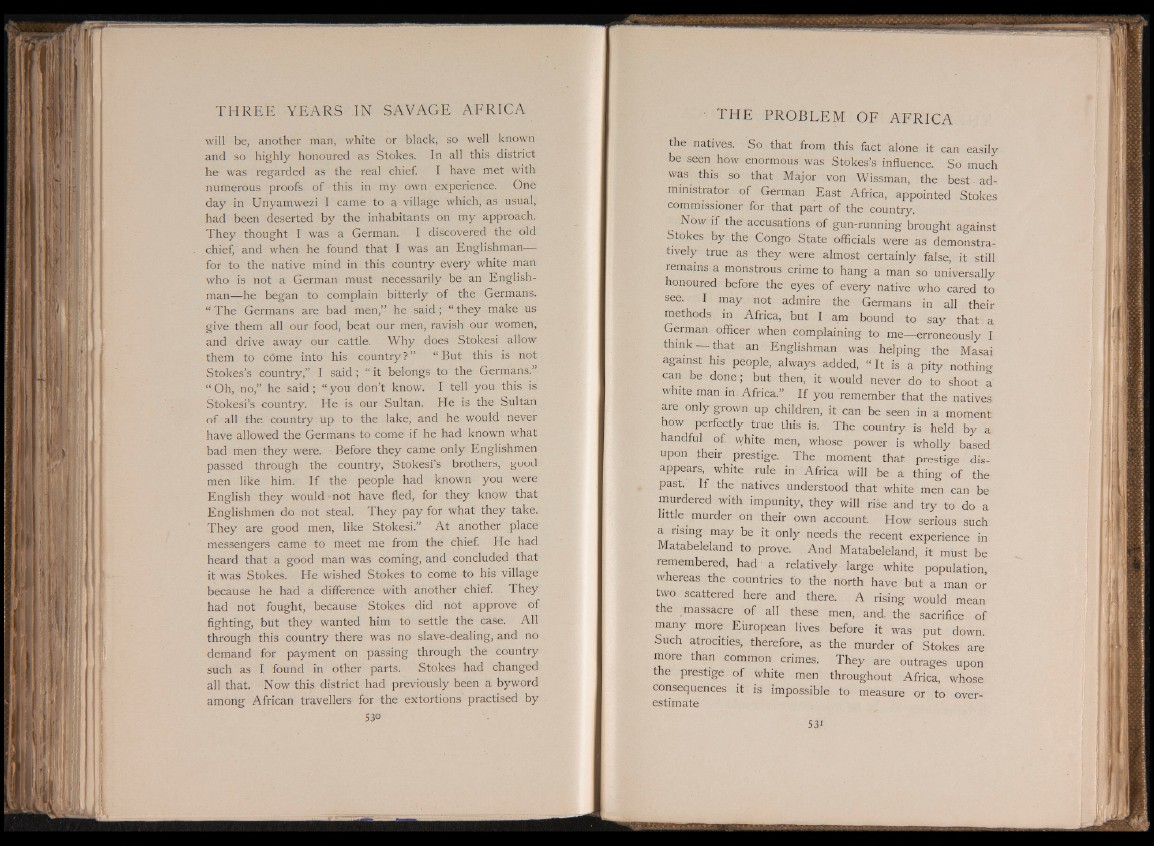
will be, another man, white or black, so well known
and so highly honoured as Stokes. In all this district
he was regarded as the real chief. I have met with
numerous proofs of this in my own experience. One
day in Unyamwezi I came to a village which, as usual,
had been deserted by the inhabitants on my approach.
They thought I was a German. I discovered the old
chief, and when he found that I was an Englishman—
for to the native mind in this country every white man
who is not a German must necessarily be an Englishman—
he began to complain bitterly of the Germans.
“ The Germans are bad men,” he said; “ they make us
give them all our food, beat our men, ravish our women,
and drive away our cattle. Why does Stokesi allow
them to come into his country ? ” “ But this is not
Stokes’s country,” I said ; “ it belongs to the Germans.”
“ Oh, no,” he said; “ you don’t know. I tell you this is
Stokesi’s country. He is our Sultan, He is the Sultan
of all the country up to the lake, and he would never
have allowed the Germans to come if he had known what
bad men they were. Before they came only Englishmen
passed through the country, Stokesi’s brothers, good
men like him. If the people had known you were
English they would not have fled, for they know that
Englishmen do not steal. They pay for what they take.
They are good men, like Stokesi.” At another place
messengers came to meet me from the cjiief. He had
heard that a good man was coming, and concluded that
it was Stokes. He wished Stokes to come to his village
because he had a difference with another chief. They
had not fought, because Stokes did not approve of
fighting, but they wanted him to settle the case. All
through this country there was no slave-dealing, and no
demand for payment on passing through the country
such as I found in other parts. Stokes had changed
all that. Now this district had previously been a byword
among African travellers for the extortions practised by
the natives. So that from this fact alone it can easily
be seen how enormous was Stokes’s influence. So much
was this so that Major von Wissman, the best administrator
of German East Africa, appointed Stokes
commissioner for that part of the country.
Now if the accusations of gun-running brought against
Stokes by the Congo State officials were as demonstratively
true as they were almost certainly false, it still
remains a monstrous crime to hang a man so universally
honoured before the eyes of every native who cared to
see. I may not admire the Germans in all their
methods, in Africa, but I am bound to say that a
German officer when complaining to me—erroneously I
think — that an Englishman was helping the Masai
against his people, always added, “ It is a pity nothing
can be done; but then, it would never do to shoot a
white man in. Africa.” If you remember that the natives
are only grown up children, it can be seen in a moment
how perfectly true this is. The country is held by a
handful of white men, whose power is wholly based
upon their prestige. The moment that prestige disappears,
white rule in Africa will be a thing of the
past. If the natives understood that white men can be
murdered with impunity, they will rise and try to do a
little murder on their own account. How serious such
a rising may be it only needs the recent experience in
Matabeleland to prove. And Matabeleland, it must be
remembered, had a relatively large white population,
whereas the countries to the north have but a man or
two scattered here and there. A rising would mean
the massacre of all these men, and. the sacrifice of
many more European lives before it was put down.
Such atrocities, therefore, as the murder of Stokes are
more than common crimes. They are outrages upon
the prestige of white men throughout Africa, whose
consequences it is impossible to measure or to overestimate